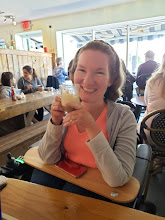"After this I looked, and there before me was a great multitude
that no one could count,
that no one could count,
from every nation, tribe, people and language,
standing before the throne and before the Lamb.
They were wearing white robes
standing before the throne and before the Lamb.
They were wearing white robes
and were holding palm branches in their hands.
And they cried out in a loud voice:
'Salvation belongs to our God, who sits on the throne,
'Salvation belongs to our God, who sits on the throne,
and to the Lamb.'
...'These are they who have come out of the great tribulation;
they have washed their robes
they have washed their robes
and made them white in the blood of the Lamb.'"
~ Revelation 7:9-10, 14
Yesterday, I was just savoring these verses,
and imagining what it will be like to stand among the multitude
before the throne of God,
forgiven and made fully righteous in Jesus.
Dream with me for a moment about what this will look like:
White robes -
spotless, shimmering,
light, cool, soft and flowing,
finest linen, seamless,
delicate yet indestructible,
perfectly and uniquely tailored,
folding and draping and adorning -
and washed in the blood of the Lamb.
What a bizarre concept!
It's one of those things we used to sing and tap our foot about;
one we passionately pounded pulpits about;
one we used to smile and pretend we understood, and now...
now we are actually wearing it.
I squint and examine the tightly woven threads,
and then I can see the crimson stains,
so completely absorbed deep within,
yet working upon the linen in a way that no bleach ever could -
renewing and refining,
not just blotting out but adding Life.
I remember learning once that white light is
the presence and absolute consummation of every color...
such is the holiness and purity of God:
the essence of everything true united,
and the absence of everything false.
I recall loving the smell of clean laundry,
the fresh powdery scent of detergent.
So I bury my nose in my newly washed sleeve
and breathe deeply.
I don't know what surprises me more -
that it really smells like blood,
or that it doesn't repulse me.
It is the fragrance of Christ,
to me as lovely and rich and intoxicating as fine red wine.
Salty -
in a way that makes me thirsty for Living Water.
Bitter and sour -
in a way that satisfies the deepest corners of my heart.
Powerful and potent -
in a way that consumes all my heart, all my soul, all my strength.
All at once, I am reminded of
sin's captivity,
the sacrifice of Jesus, the Lamb,
how he conquered death,
and the freedom and victory that we have now
because he has washed us!
I realize I wear the presence,
the righteousness,
the authority,
the beauty,
the grace,
the mercy,
the love of Jesus!
What was once in my spirit,
I now feel on my skin,
wrapped all around me.
A mighty rushing impulse rises up in me to sing and shout,
and I realize my voice is just joining in with all the other
white-robed saints around me.
Millions - uncountable -
of every shade of color,
from every corner of that old world,
every language and dialect spoken and heard,
all together knowing our song was the same,
giving glory and honor to the Lamb of God,
who washed away the sins of the world with his blood...
Hallelujah!
"Therefore, they are before the throne of God
and serve him day and night in his temple;
and he who sits on the throne
will shelter them with his presence.
Never again will they hunger; never again will they thirst.
The sun will not beat down on them, nor any scorching heat.
For the Lamb at the center of the throne will be their shepherd;
he will lead them to springs of living water.
And God will wipe away every tear from their eyes."
- Revelation 7:15-17
and serve him day and night in his temple;
and he who sits on the throne
will shelter them with his presence.
Never again will they hunger; never again will they thirst.
The sun will not beat down on them, nor any scorching heat.
For the Lamb at the center of the throne will be their shepherd;
he will lead them to springs of living water.
And God will wipe away every tear from their eyes."
- Revelation 7:15-17





